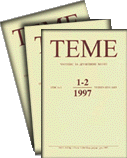НЯКОИ ПРОБЛЕМИ НА ОТНОШЕНИЯТА ДЪРЖАВА-ЦЪРКВА В СЪРБИЯ И ЧЕРНА ГОРА, МАКЕДОНИЯ И БЪЛГАРИЯ ДНЕС: ЗАКОНОВИ ТЕКСТОВЕ И СОЦИАЛНО-ПОЛИТИЧЕСКИ КОНТЕКСТ
Some Problems of State-Church Relationships in Serbia and Montenegro, Macedonia and Bulgaria. The Legal Texts and the Social-Political Context
Author(s): Nonka BogomilovaSubject(s): Politics / Political Sciences
Published by: Универзитет у Нишу
Keywords: Law; Religion; Religious Communities; State; Church; Political Context
Summary/Abstract: Analysis of the legal regulation of state-Church relations in the studied countries, whatever the stage of development of their laws on religions, shows: a) trends toward equality of the religions that were predominant until recently (the Orthodox Churches) with other confessions, and the division of confessions into two categories, one of which has certain legal advantages: a simplified registration procedure, the right of religious education in the secondary schools; in Bulgaria this preference is reserved for the Orthodox Church; b) decrease of the role of the state as regulator of confessions, but also preservation of some authority to exercise control, issue licenses and impose penalties, in connection with which religious communities, human rights organizations and political parties have appealed to the Constitutional Courts; c) recognition of religious communities as legal subjects whose legal status is currently being defined. The overall legal philosophy of the laws on religions in the studied countries can be characterized as ambiguous, trying to combine and reconcile two principles: a) achieving European legal standards of freedom, pluralism, equality, tolerance in the sphere of religion; b) "restoring justice" or restoring the situation that existed in these countries before the communist regime, an approach that has allowed some retreat from these principles. With the overcoming of this "nostalgic" mentality, it will become possible to further democratize the legislature in this sphere. The dominant religious subjects in these countries (the Orthodox Churches) are in an ambiguous situation with regard to the state and political sphere: a) being institutional elements of the as yet unstable state identity (especially in the case of Macedonia and Serbia and Montenegro), the state tends to support and give them preference in some respects; b) being a possible institutional competitor of the political elite when vying for influence over mass demands and moods, the elite is motivated to limit the potential influence of the Church; the Churches are financially dependent and internally divided (the division in the Bulgarian Orthodox Church).
Journal: Teme - Časopis za Društvene Nauke
- Issue Year: 2005
- Issue No: 01+02
- Page Range: 77-107
- Page Count: 31
- Language: Serbian

